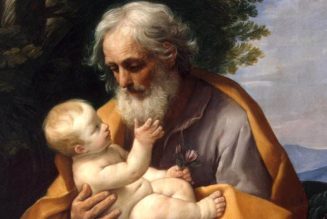
A 17TH-CENTURY ITALIAN RENAISSANCE DEPICTION OF THE RISEN CHRIST AND THE MADONNA, WITH ANGELS AND SAINTS (Shutterstock)
Few would have foreseen, as we packed into pews on Ash Wednesday, the Lent we had in store: that our fast would become an involuntary one from the Living Bread, that our almsgiving would feature social distancing from those in need, and that our prayer would occur mostly in the domestic church and in cyberspace.
This year we have all been led into the desert, separated from the distractions of sports, late-night shows, parties, outside commitments, even face-to-face contact with friends, neighbors and extended family.
We have all had an extended Lenten meditation on death, on how we are dust and unto dust will return, not knowing the day or the hour when the earthly end will come.
It’s a Lent that we will never forget.
But if Lent is meant to prepare us for Easter — not just what Easter symbolizes, but the death-and-life reality it effects — then perhaps this Lent might prove to be, for all its vicissitudes and sufferings, one of the most spiritually fruitful of our lives.
What Christians celebrate on Easter is far more than a liturgical rite. It’s more than the commemoration of something that happened one early Sunday morning. It is the most consequential event in the history of the world. It is the triumph of resurrection over crucifixion, life over death, light over darkness, love over hatred, faith over fear. And regardless of the current circumstances, the power of Christ’s victory remains.
It will be a huge disappointment — for priests and faithful alike — if we are not able to celebrate this victory together in packed churches and enter sacramentally into the passion, death and resurrection we commemorate and proclaim. But even if we are not able to celebrate Easter together liturgically, even if we are not able to receive Jesus’ risen Body and Blood in Holy Communion, even if we are not able to welcome into the Church as scheduled the new Catholics who through baptism are preparing to enter into Jesus’ death and resurrection, the power of what we memorialize on Easter is real.
And it should impact our lives just as it impacted Mary Magdalene in the Garden, the 10 apostles cowering in the Upper Room, the disciples on the Road to Emmaus, doubting Thomas before Jesus’ wounds, and Saul of Tarsus outside the gates of Damascus.
The fact of Jesus’ triumph should first make us courageous. We see the dramatic metamorphosis the Resurrection had on the apostles, changing them from those who would leave the Cenacle to betray and abandon Jesus to those who would intrepidly bear witness to him. When the same Sanhedrin that had gotten Jesus crucified had Peter and John scourged and instructed them never to speak again about Jesus, they rejoiced at suffering on account of Jesus’ name and said they could not but speak of what they have seen and heard. They were undaunted because they realized that even should they be crucified like Jesus, they, like Jesus, would be raised. They were no longer afraid of death or suffering. The resurrection of Jesus should fill us with similar courage, not just in the face of the coronavirus, but in general.
The second great consequence of Jesus’ resurrection is a vibrant faith in eternal life. Each of us can say with Job, “I know that my Redeemer lives!” (Job 19:25). Each of us can echo St. Paul, “Where, O death, is your victory? Where, O death, is your sting? … God gives us the victory through our Lord Jesus Christ!” (1 Corinthians 15:55-57). At a time when many have been stung by the sudden death of those we know and love, where it seems the coronavirus has triumphed, we know that an imperishable crown awaits those who believe, live and die in Christ (1 Corinthians 9:25). That’s why Christians “do not grieve like the rest who have no hope” (1 Thessalonians 4:13). We grieve differently, because God not only so loved the world that he gave his only Son that we might not perish, but raised his Son as the first fruits of those who have died (John 3:16; 1 Corinthians 15:20). The Resurrection gives us that indomitable hope.
The third impact is a vivid awareness that, even if we are socially isolated, even if we are solitarily hooked up to a ventilator, we are not alone. The same Risen Jesus who walked through the closed doors of the Upper Room can traverse the doors of our house or the thickest hospital quarantines. The same Jesus who appeared to the disciples heading to Emmaus wants to accompany us, join our conversation, and make our hearts burn by relating present events to what God has revealed (Luke 24). The same Jesus who called Mary Magdalene by name and pierced her sorrow seeks to call each of us and transform our fear and sorrow. The essence of the Gospel, as Pope Francis wrote in Evangelii Gaudium, is “Jesus Christ loves you, he gave his life to save you, and now he is living at your side every day to enlighten, strengthen and free you” (164). Jesus has not left us orphans or abandoned, but is present, as the Good Shepherd, to lead us through the dark valley to verdant pastures (Psalm 23). He is very much alive and is with us, loving and strengthening us.
The fourth consequence of Jesus’ resurrection is that our minds and hearts are uplifted. “If you were raised with Christ,” St. Paul proclaims to us at Mass on Easter Sunday morning, “seek what is above, where Christ is seated at the right hand of God. Think of what is above, not of what is on earth, for you have died, and your life is hidden with Christ in God” (Colossians 3:1-3). The Resurrection lifts us from obsessing about worldly things and helps us to view everything increasingly from God’s perspective. We recognize that certain fixations that occupy our time and attention don’t really matter and place our treasures, and our hearts, in the things that truly last (Matthew 6:21). We prioritize prayer and worship, charity and growing in faith through reading sacred Scripture and taking advantage of the great spiritual resources now available. As social distancing has made all of us, to some degree, “hidden with Christ in God,” we are all called nevertheless to “live in newness of life” (Romans 6:4) with our hearts and minds set above.
“Christ’s resurrection is not an event of the past but contains a vital power that has permeated this world,” Pope Francis reminded us in Evangelii Gaudium (276). The life-giving power is meant to permeate our day-to-day lives, giving us courage, strengthening our faith in eternal life, strengthening our awareness of God, and renewing our entire lives. It’s meant to make us living signs of the Resurrection, burning tapers bringing the light of Christ’s resurrection to the darkness that envelops so many. This Lent has prepared us to recognize our need for that vital power even more.
We pray that sometime during the 50 days of the Easter season we will be able to celebrate Christ’s resurrection together sacramentally as we imitate Christ’s bursting forth from the empty tomb and leave our homes to come together to rejoice in Christ’s triumph and that victory’s life-giving power. Until then, we celebrate that triumph united in faith with the means God provides.
Father Roger J. Landry is a priest
of the Diocese of Fall River, Massachusetts.







